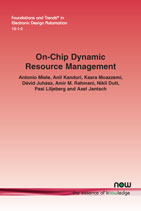On-Chip Dynamic Resource Management
By Antonio Miele, Politecnico di Milano, Italy | Anil Kanduri, University of Turku, Finland | Kasra Moazzemi, University of California, Irvine, USA | Dávid Juhász, TU Wien, Austria and Imsys AB, Sweden | Amir R. Rahmani, University of California, Irvine, USA and TU Wien, Austria | Nikil Dutt, University of California, Irvine, USA | Pasi Liljeberg, University of Turku, Finland | Axel Jantsch, TU Wien, Austria, axel.jantsch@tuwien.ac.at
Abstract
The need for dynamic resource management has shadowed the exponential growth of on-chip transistor capacity, and the challenge is accentuated by the heterogeneity of resources, and the bewildering variety of constraints and requirements of applications, platforms and users. The field has started with a few research papers in the early 1990s but has grown today to over hundred yearly publications, leading to an accumulated body of literature presumable far above 1000 papers. We focus on the dynamic (run-time) management of onchip resources and mostly ignore design-time techniques and off-chip resources of larger electronic systems. Moreover, we do not attempt a complete review of all published work on the topic. Rather, this survey provides a structured review and discussion of the state of the art and is divided along the primary objectives of resource management techniques: performance, power, reliability and quality of service, each of which has its dedicated chapter. We observe that many works describe dedicated techniques for point problems, like minimizing power or maximizing lifetime. In recent years more and more methods have started to appear that address two, three or more different goals of resource management, but work with a holistic scope that attempts to address and balance all relevant objectives is still rare. An exception is the area of reliability and life-time management. There we see that a large majority of approaches may be considered as holistic. Observing current limitations and recent trends we assume that global and holistic approaches will make the most valuable contributions to this field in the years to come and therefore we expect that the focus of research will gradually shift to systematic methods combining point techniques in order to pursue and balance all relevant system goals of highly dynamic, adaptive systems.
On-Chip Dynamic Resource Management
Resource management has a long history in computing, from the early days of time-shared machines with pioneering fundamental work on run-time systems, distributed systems, real-time operating systems and middleware. The longevity and fundamental importance of the topic has resulted in an incredibly large body of work for on-chip resource management in the past two decades. The possible combinations of sub-topics and variations in the assumptions, use of different terminology, metrics, goals, and use-cases, leaves anyone attempting to review the literature overwhelmed.
On-Chip Dynamic Resource Management is the first comprehensive and coherent review of all aspects of on-chip run-time resource management designed to facilitate understanding of recent trends in dynamic and adaptive strategies. The authors provide the reader with a framework within which they can navigate both existing, as well as evolving research efforts in on-chip dynamic resource management.
Written by leading experts in the field, researchers and students are provided a structured review and discussion of the state of the art that is divided along the primary objectives of resource management techniques: performance, power, reliability and quality of service.
